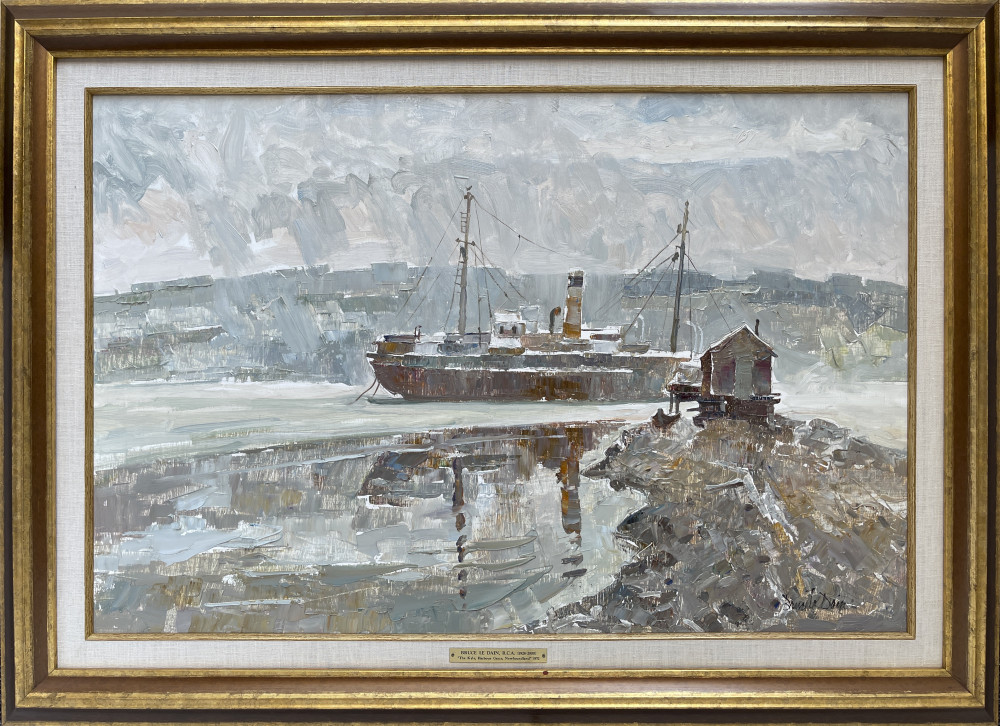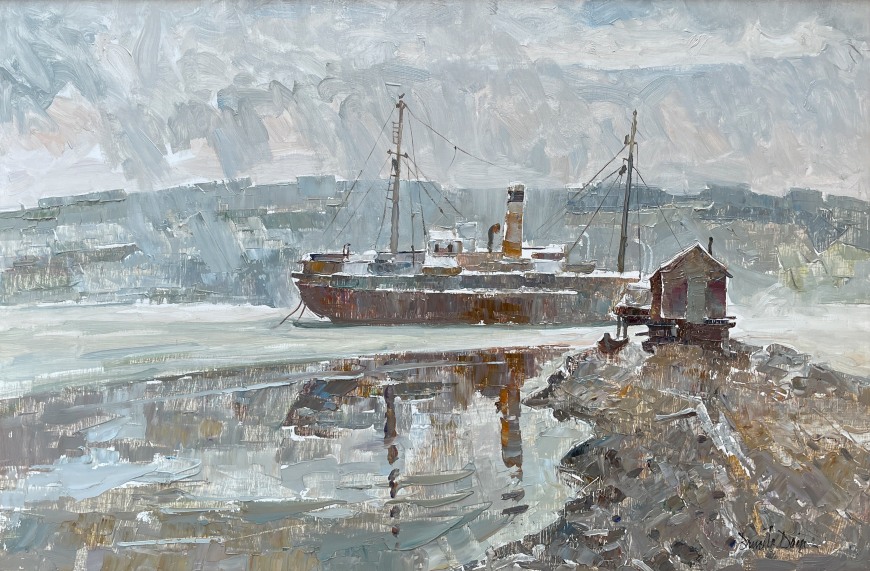-
Œuvres d'art
Bruce LeDainThe Kyle, Harbour Grace, Newfoundland, 19721928-2000Oil on panel20 x 30 in
50.8 x 76.2 cmSoldInscriptions
signed, ‘Bruce Le Dain’ (lower right); titled ‘THE KYLE, HARBOUR GRACE, NEWFOUNDLAND’ (verso, upper left), signed and dated ‘Bruce Le Dain 1972’ (verso, centre)Provenance
Galerie Walter Klinkhoff Inc., Montreal;
Acquired from the above by the present owner.
The S.S. "Kyle" is a famous steamship measuring 220 feet in length built in Newcastle-on-Tyne, England, built in 1912-13.
Under the direction of its first captain, Lorenzo Stevenson, the "Kyle" arrived in St. John’s on May 20, 1913, for coastal service. Originally the "Kyle" was primarily used as a transport ship, bringing people and goods from the island to Labrador. The steamship also did the Port aux Basques-North Sydney ferry run for several years. Though strengthened for ice and nicknamed the “Bulldog of the North,” the ship was not the strongest in Reid Newfoundland Company's fleet, but it was the fastest; at top speed,In 1923 the Canadian National Railway acquired the ship from Reid Newfoundland Company. In 1927 the "Kyle" gained international recognition, discovering the wreckage of the "Old Glory" aircraft in the Atlantic. Attempting to fly across the Atlantic, the "Old Glory" crashed 500 miles off the coast of Cape Race, Newfoundland. (Notably, an aircraft that left Harbour Grace airstrip around the same time, the "Sir John Carling", was never recovered.)
As the first regularly scheduled ferry between Newfoundland and coastal Labrador, the "Kyle" is often fondly remembered in twentieth-century stories of the latter.
In 1961 the "Kyle" was converted to a sealing ship, bringing sealers to the ice floes for several successive springs. On one sealing expedition, the ship was damaged and tied up in Harbour Grace for future repairs. However, on February 4, 1967, a storm and strong northeast wind blew the "Kyle" from its moorings, carrying her to the mussel bank in Riverhead, Harbour Grace, where she has remained ever since.
_________________________________
Bruce Le Dain 1928-2000
Throughout his painting career, Le Dain very much enjoyed painting the ocean, the rivers and the streams. The last several years of his all too brief life, although living in Montreal, Bruce sought inspiration spending part of the year downeast in a cabin by the sea.
For over forty years he painted his subjects directly from nature, travelling extensively throughout Canada, the New England Seacoast and in parts of England and the Continent.
Born in Montreal in 1928, recognition of his talent came early when at the age of 20 he was one of the youngest painters selected for the prestigious Annual Spring Exhibition at the Montreal Museum of Fine Arts and again four years later in 1952-53.
In 1953 Le Dain moved to London and spent four years in further studies in graphic arts. This early training as a graphic designer still underscores the abstract pattern and design one finds in his paintings today. He returned to Canada and in 1966 had his first canvas accepted for the Royal Canadian Academy’s 87th Annual Exhibition at the National Gallery of Canada, Ottawa.
Bruce had been splitting his time between full time employment with a prestigious advertising agency and his art. In 1977 he established a studio in Montreal to pursue painting full-time. His works unanimously contain strong elements of atmosphere and light. At its best, the work is of serene contemplation. The paintings appear to contain and be contained by stillness. The subject matter of his paintings reflects a warm sensibility and a close relationship and concern for the natural environment. Closer study of his work leaves one with a sense of peace and a quiet calm. His solo exhibitions at our Walter Klinkhoff Gallery attracted record crowds. Although exhibiting almost exclusively in Montreal, his work enjoys a wide following among private collectors throughout Canada as well as in the United States, England, France, Israel, Holland and Germany. His work appeared in over fifty corporate collections.
For those of us who knew Bruce, he was an artist who had almost a spiritual passion and dedication for anything he undertook. His enthusiasm was infectious.
Le Dain was generous with his time, a true giver. It was with that generosity he made formidable commitments at personal and professional sacrifice for the benefit of numerous objectives including Katimavik, Verdun’s Douglas Hospital and the Royal Canadian Academy of the Arts where he served a term as President.
1sur 6















